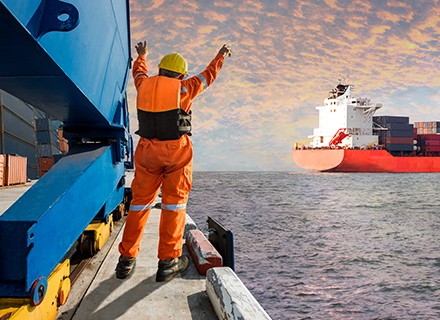On Saturday, July 20, 2019, the impounded Iranian crude oil tanker Grace 1 is silhouetted while it is anchored off the coast of Gibraltar. As Iran battles against the United States sanctions that are hampering its oil exports and lashes out following the detention of one of its ships on July 4 near Gibraltar, tensions in the Strait of Hormuz have risen recently.
Costs for transporting energy are rising as a lack of ships to transport necessary fuels this winter as a result of Europe’s rush for supply.
As the conflict in Ukraine shows no signs of coming to an end, ships are transporting liquefied natural gas (LNG), diesel, and crude oil to Europe from farther afield than usual to replace Russian energy supplies.
According to maritime experts, this is keeping vessels busy for longer and delaying their return to service, which has caused an increase in international freight prices.
During this time of year, liquefied natural gas freight prices are high and on pace to surpass the winter peak of the previous year.
According to data from the Baltic Exchange, shipping a cargo of United States oil to China now costs more than it did in 2020, and sending a cargo of naphtha petrochemical feedstock from the Middle East to Japan now costs more than two times as much as it did in March.
According to traders and shipowners, the shortage of ships poses a threat to Asian economies that buy oil and gas from the United States because it may be challenging for them to obtain spare cargo quickly if the winter turns extremely cold.
Even shipments of petrochemical feedstock are becoming more costly to transport, adding to the pressure on purchasers already struggling with sluggish demand for chemicals as the rate of manufacturing slows.
According to Oystein Kalleklev, chief executive officer of shipowner Flex LNG Management AS, there are very few liquefied natural gas ships available for lease through the winter, and only for brief excursions.
Oystein Kalleklev pointed out that shipowners are demanding their ships back because their fleet has been fully booked and they need them to be ready for when the Freeport LNG export plant starts up again.
After a fire at the Freeport facility in Texas in June disrupted a sizable chunk of United States LNG exports, the facility is expected to resume operations in November.
Energy firms are refusing to release liquefied natural gas ships as they usually do at the end of summer because firms are booking vessels for the winter season much earlier than usual.
According to traders and shipbrokers, petroleum tankers bought at lower freight rates are being retained on rent, sometimes consuming additional fuel to travel between Singapore and Malaysia for the sole purpose of keeping the boats.
To ensure supplies in the competitive market, dealers are refuelling ships at sea with natural gas and petroleum fuels.
Xeneta chief analyst Peter Sand said, “What we’ve seen in shipping this year has been remarkable as a result of the war in Ukraine.”

